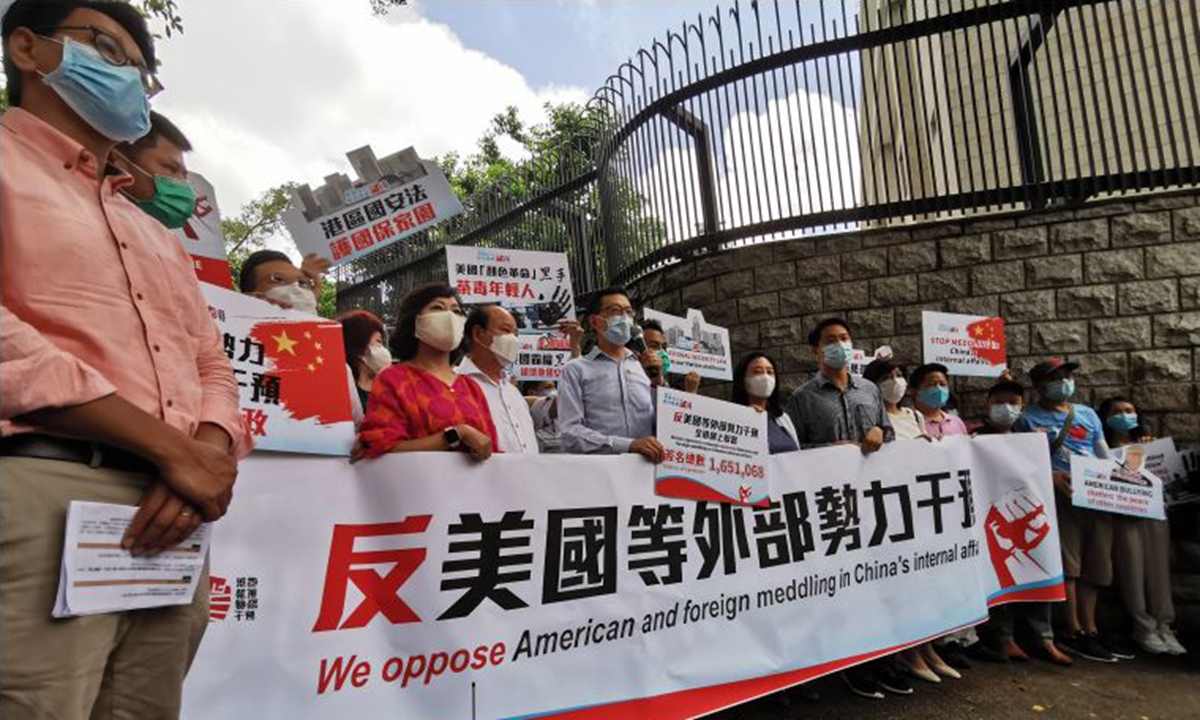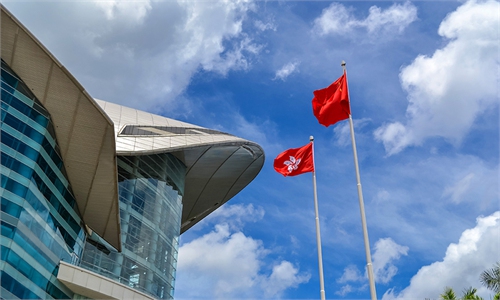
Hong Kong residents hold banners opposing the US and foreign meddling in China's internal affairs in front of the US Consulate General in Hong Kong on July 2, 2020.
Chinese State Councilor and Foreign Minister Wang Yi on Sunday expressed China's firm stance on topics of sovereignty and security, including Hong Kong, Taiwan, Xinjiang and the South China Sea, making the red line clear and sending an alarm to countries that have used China's core interests as leverage to jeopardize the nation's development, analysts said.
At the foreign minister's press conference on the sidelines of the ongoing two sessions, Wang said improving Hong Kong's electoral system and implementing the principle of patriots administering the city is a constitutional, legitimate, just and reasonable act. Wang's remarks were in response to certain countries hyping the topic to stir up trouble.
For the island of Taiwan, Wang reiterated it is an inseparable part of Chinese territory. Both sides of the Taiwan Straits must and will be reunified, and China is capable of cracking down on any "Taiwan Independence" secessionist attempt.
The One-China principle is an untouchable red line that has no room for compromise, Wang said, urging the new US administration to fully recognize its sensitivity, end the previous administration's dangerous practice of "playing with fire," and handle the Taiwan question with caution.
Wang also used numbers to refute the "genocide" lies on Xinjiang. The Uygur population doubled in the past four decades, the size of the region's economy soared by 200 times, and the average life expectancy increased from 30 to 72 years, which all proved that genocide is pure political manipulation by some rumormongers and anti-China politicians.
Li Haidong, a professor at the Institute of International Relations of the China Foreign Affairs University, told the Global Times on Sunday that as a window on Chinese foreign policy, Wang's press conference conveyed China's sovereignty view and sent a clear message to the world that sovereign security is China's bottom line and a core interest that allows no concessions.
Some Western countries keep using democracy, human rights and other excuses to stir up trouble in Hong Kong, Taiwan and Xinjiang, in an attempt to use China's domestic affairs as leverage to contain our development, Li said.
The expert noted the US and some other Western countries wanted China to be chaotic and weak, but challenging China on sovereignty and security has not only exposed their indifference to the non-interference principle in international relations, but it also cast bilateral relations into uncertainty.
Wang emphasized that Chinese people have the biggest say in China's internal affairs.
"Under the condition of respect for Chinese sovereignty, we are willing to communicate with all parties about the facts and disperse concerns, but we do not accept groundless accusations and smears, or violation of our core interests," Wang said.
In this sense, making trouble in the South China Sea is also a trick that some non-regional countries, including the US, have played to disturb regional peace and stability, analysts said.
Wang said that the US and some other Western countries "fear the South China Sea is not chaotic" and came to stir up trouble in the name of "freedom of navigation." But China and ASEAN members' efforts over the past few years have demonstrated that regional countries have the confidence, capability and wisdom to handle disputes.



